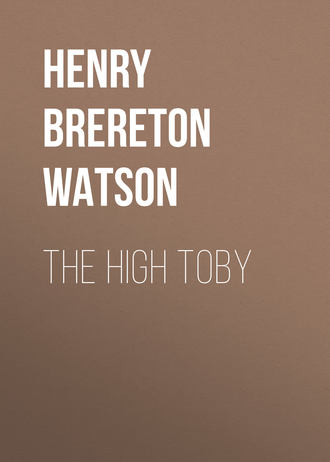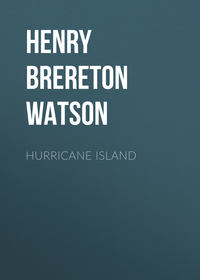 полная версия
полная версияThe High Toby
"You shall drink when ye reach Cobham, Crossway," says he, looking up at me, "and mind your ways, damn ye."
And at that he made no more ado, but humming an air he lurched into the carriage. I pulled out the nags, and turned their heads so that they were set for the north. And then I whistled low and short—a whistle I knew that the mare would heed, and I trusted that she would bring her companion with her. Then the wheels rolled out upon the road and Timothy Grubbe and I were bound for London all alone.
As I turned up the London road that swept steeply up the downs I looked back, and behind the moon shone faintly on Calypso, and behind her on the dead man wagging awkwardly in his stirrups.
I pushed the horses up the steeps of the London road as fast as might be, but the ruts were still deep in mud, and the carriage jolted and rocked and swayed as we went. The wind came now with a little moaning sound from the bottom of the valley, and the naked branches creaked above my head, for that way was sunken and tangled with the thickets of nut and yew. And presently I was forced to go at a foot pace, so abrupt was the height. The moon struck through the trees and peered on us, and Grubbe put his head forth of the window.
"Why go you not faster, damn ye?" says he, being much in liquor.
"'Tis the hill, your honour," said I.
He glanced up and down.
"What is't comes up behind?" says he, shouting. "There is a noise of horses that pounds upon the road."
"'Tis the wind," says I, "that comes off the valley, and makes play among the branches."
He sank back in his seat, and we went forward slowly. But he was presently out again, screaming on the night.
"There is a horseman behind," says he. "What does he there?"
"'Tis a traveller, your honour," say I, "that goes, no doubt, by our road, and is bound for London."
"He shall be bound for hell," says he, and falls back again.
The horses wound up foot by foot and emerged now upon a space of better light. I looked round, and there was Grubbe, with his head through the window and his eyes cast backwards.
"What fool is this," says he, "that rides so awkwardly, and drives a spare horse? If he ride no better I will ask him to keep me company, if he be a gentleman. Many gentlemen have rode along of me, and have rode to the gallows tree," and he chuckled harshly.
"Maybe he will ride with you to the Gallows Gate, sir," says I.
"Why, Crossway," says he, laughing loudly, "you have turned a wit," says he; and once more withdrew his head.
By now we were nigh to the top of the down, and I could see the faint shadow of the Triple Beam. With that I knew my journey was done, and that my work must be accomplished. I pulled to the horses on the rise, and got down from my seat.
"Why d'ye stop, rascal?" called Grubbe in a fury, but I was by the door now and had it open.
"Timothy Grubbe," said I, "ye're a damned rogue that the devil your master wants, and he shall have ye."
He stared at me in a maze, his nostrils working, and then says he in a low voice,—
"So 'tis you."
"Your time has come, Timothy," said I, flinging off my cloak, and I took my sword. "Out with you, worm!"
He said never a word, but stepped forth and looked about him. He was sobered now, as I could see from his face, which had a strange look on it.
"Ye're two rascals to one, Dick," says he, slowly, looking on the dead man on his horse which had come to a stop in the shadows.
"No," says I. "This gentleman will see fair play for us."
Grubbe took a step backward. "Sir," says he, addressing the dead man, but at that moment Calypso and her companion started and came into the open, and the moon shone on the face of the dead. Grubbe uttered a cry and turned on me. His teeth showed in a grin.
"No ghost shall haunt me, Dick," says he. "Rather shall another ghost keep him company;" and his wry neck moved horridly in the wan light.
I pointed upwards where the tobyman hung in chains, keeping his sheep by moonlight. "There's your destiny," said I, "there's your doom. Now defend ye, damn ye, for I'll not prick an adder at a disadvantage."
He drew his blade, for no man could say that Timothy Grubbe, time-server, pander, and traitor as he was, lacked courage. Suddenly he sliced at me, but I put out and turned off the blow.
"If you will have it so soon," said I, "in God's name have it," and I ran upon him.
My third stroke went under his guard and took him in the midriff. He gave vent to an oath, cursed me in a torrent, and struck at me weakly as he went down. He was as dead as mutton almost ere he reached the ground.
I have never been a man of the Church, nor do I lay any claim to own more religion than such as to make shift by when it comes to the end. No, nor do I deny that I have sundry offences on my conscience, some of which I have narrated in my memoirs. But when it comes to a reckoning I will make bold to claim credit in that I rid the world he had encumbered of Timothy Grubbe—the foulest ruffian that ever I did encounter in the length of my days on the roads.
I climbed the beam and lowered the poor tobyman, and it took me but a little time to make the exchange. The one I left where he had paid quittance in the peace of this earth, and t'other a-swinging under the light of the moon on Gallows Gate.
I have said my journey was done, but that was not so. There was more for me to do, which was to deliver poor Masters at his ladylove's and break the unhappy news. And so, leaving the carriage where it stood, with the patient horses, that were cropping the grass, I mounted the mare and began to go down the long span of the downs to the north. 'Twas late—near midnight—when I reached Effingham and found my way to the manor. I rapped on the door, leaving Calypso and t'other in the shadows by the house, and presently one answered to my knock. "What is it?" says she.
"'Tis a stranger," says I, "that has news of great import for Mrs Anne Varley, whom I beg you will call."
"She cannot hear you," said she, "'tis her wedding-night."
"What!" said I, in amazement, and instantly there flowed in upon me the meaning of this. Damn all women, save one or two, thinks I. And I turned to the maid again, with my mind made up.
"Look you, wench," said I, "this is urgent. I have an instant message that presses. And if so be your mistress will bear with me a moment and hold discourse, I'll warrant she shall not regret it—nor you," says I, with a crown piece in my palm.
She hesitated, and then, "Maybe she will refuse," says she. "She hath but these few hours been wed."
"Not she," said I, "if you will tell her that I bring good news, great news—news that will ease her spirit and send her to her bridal bed with a happy heart."
At that she seemed to consent, and with my coin in her hand she disappeared into the darkness of the house. It must have been some ten minutes later that a light flashed in the hall, and a voice called to me. "Who is it?" it asked, "and what want you at this hour?"
I looked at her. She was of a pretty face enough, rather pale of colour, and with eyes that moved restlessly and measured all things. Lord, I have known women all my life in all stations, and I would have pinned no certainty on those treacherous eyes. She was young too, but had an air of satisfaction in herself, and was in no wise embarrassed by this interview. I had no mercy on her, with her oaths of constancy writ in water that feigned to be tears, and her false pretences.
"Madam," said I, civilly, "I hear you're wed to-day to a gentleman of standing."
"What is that to you, sir?" she asked quickly.
"'Tis nothing, for sure," said I, "but to a friend of mine that I value deeply 'tis much."
"You speak of Mr Masters," said she, sharply, and with discomposure. "Sure, if he be a gentleman he will not trouble me when he knows."
"Anne!" cried a voice from the top of the stairs, "Anne!"
'Twas her bridegroom calling. Well, she should go to him in what mood she might when I had done with her.
"He will never know," says I, "unless he have it from yourself."
"Anne!" says the voice above the stairs.
"He shall not—I will not," she cried angrily. "I will not be persecuted, 'twas all a mistake."
I whistled, and Calypso emerged from the night, and behind Calypso was the horse with its burden.
An anxious look dawned in her face. "I am insulted—" says she, and paused quickly. "Edward!" she called, and put a hand to her bosom.
"Anne, my dove!" cried the voice, "where are you? Come, child, 'tis late."
The horses came to a stop before the door, with the body in the saddle, bound to the crupper.
"What is it?" she cried in alarm, and suddenly she shrieked out, clutching at the door-post. "It is an omen—my wedding-night."
"Ay," says I, "which be your bridegroom, he that calls out or he that is silent? Call on him and he hears not."
Peal after peal went up now from her, and the house was awake with alarm. I turned away, leaving her on the door-step, and mounted the mare. As I cantered off into the night I cast a glance behind me, and a group was gathered at the door, and in that group lay Mrs Anne fallen in a swoon, with the sleeping figure on the horse before her.


